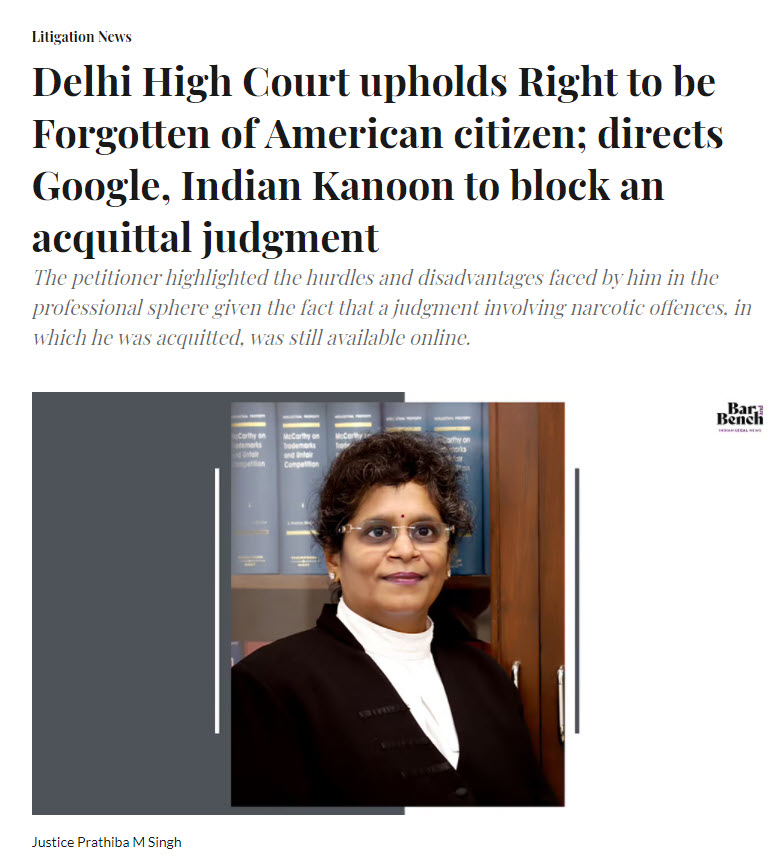(Continued from the earlier article)
The Delhi High Court judgement upholding the Right to forget of a person accused, tried and acquitted (on technical grounds) for Narcotics smuggling, 8 years after the initial judgement throws open a challenge to the Data Privacy community about how law should handle with such requests.
The Orissa High Court judgement which is a more comprehensive judgement was a different kind of situation where the honour of a lady who was a victim was involved.
The Delhi Judgement upheld the right of a person who prima facie was caught red handed but in the views of the Court , the investigators did not secure the evidence properly. The judgement ordered removal of search results not only from Google type of general search engines but also from Indian Kanoon which is a legal search facility.
Further if the Delhi High Court judgement becomes a precedent, all cases in which acquittals have taken place have to be removed from legal data base such as India Kanoon. The libraries will also have to remove access to such judgements through search facilities.
In other words, the implementation of this judgement would seriously jeopardize legal education in the country.
If India Kannon cannot provide search results of all acquittal cases, then they will have to remove hundreds of such cases. If India Kanoon has to be disallowed then Wstlaw or LexisNexis or Manupatra also have to be disallowed.
More importantly, the “Right to Forget” alters a factual information and no news papers can keep the data in their publications which have long become part of the news archives.
If a person has been charged and arrested, it is a fact. In case it was a false case, one can sympathize with the person but atleast to safeguard the information the data has to be available for the use of the posterity. By asking such data to be removed from access, the Court is trying to alter the face of history.
Further when the Right to Forget request comes after several years, a question also arises whether there should be a time limitation before which the right has to be invoked.
The decision of the Delhi High Court is therefore un implementable as a principle and will stand out as a special case courtesy the appeal. Any case in which acquittal has been granted, the information will contain the acquittal information and if some body manipulates the news and publishes only the accused part and does not provide the information of acquittal if it was available at the same point of time, it may be considered as unfair and “Inaccurate”. Under the “Right to Correction” the data subject may demand that the fact of acquittal is published wherever the information of accusation or trial or punishment is published.
If this issue is not sorted out by an appeal to the division bench of the Delhi High Court, and Right to Forget is not made like the death sentence which is available only in the rarest of rare cases, we will be doing a great injustice to the legal education.
I wish Indian Kanoon challenges this order and donot meekly accept the order. We may appreciate that the Indian PDPB 2019 subjects Right to forget as a matter to be referred mandatorily to the Adjudicator, in the GDPR, the decision vests with the Company.
Hence if a person has an adverse news about him on the Internet which amounts to a criminal track, by asking for exercising the right to forget, the information can be removed. While this cannot be implemented in print news papers, only the digital news papers would be required to follow this rule.
Companies which are doing “Background Verification” to check if a prospective employee has in fact committed any fraud or terrorist activities in his previous assignments will find that no information may be available anywhere. As a result Cyber Crime prevention will be seriously affected.
I would like the Law Enforcement to take this issue strongly and oppose the decision of the Delhi High Court. Otherwise criminals cannot be traced for past offences. In many sections of IPC, different punishments are prescribed for first commission of an offence and the subsequent commission. Now information about this would be impossible to get except in rare instances where a lawyer or a judge may remember the past incident.
I therefore request the Narcotics Board to appeal against the decision in which the legal research websites like India Kanoon, Manu Patra as well as Background verification companies in the HR field and perhaps the MHA itself should file intervention petitions.
If possible this should be tried as a PIL since erasing from memory a potential repeat offender because the earlier conviction failed is an invitation for further crimes. In trying to protect the Right of an acquitted criminal, the Delhi High Court has forgotten the Rights of the society to ensure that potential repeat offenders will go un noticed.
This is not to say that a person cannot be reformed and cannot be a useful member in the society just because he once committed an offence. After all most of us might have committed traffic offences and if we exercise our right to forget, our driving license will always be clean. If a person has been charged, however unfortunate it was, it is a matter of fact which no body can block from the “Right to Information”. This principle has to be established in a review petition or an appeal against this verdict.
Naavi
Three Judgements to follow









